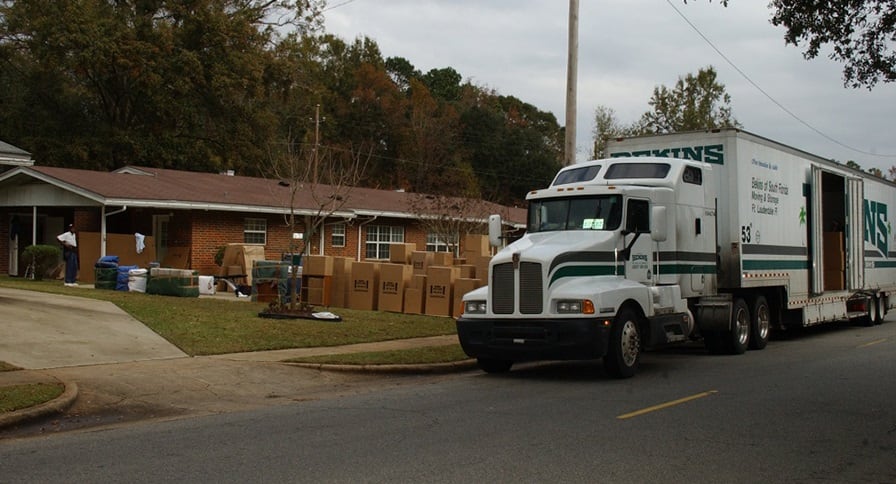The government is back on the road to outsourcing the management of military household goods moves.
Following a heavily contested contract awarded earlier this year, U.S. Transportation Command is now reviewing several revised proposals for a new contract to manage household goods moves worldwide, officials said. Bidders submitted revised proposals by Dec. 2; the contract is expected to be awarded in June, said André Kok, spokesperson for TRANSCOM.
The process had been on hold for seven months, in the wake of protests of the previously awarded contract. That contract, awarded April 30, had a potential cost of $19.9 billion over nine years. A source said at least one of the previous bidders had a lower bid.
The contract was rescinded by TRANSCOM, following an October decision by the Government Accountability Office in favor of two unsuccessful bidders who filed protests.
The new process won’t affect household goods moves in 2021. Based on the current timeline, the first shipments moved under a new contract would be during the spring 2022 season.
Following GAO’s decision, TRANSCOM moved back to the “pre-award” stage, and accepted revised proposals from previous competitive bidders.
This delays the global household goods contract by more than a year beyond TRANSCOM’s initial intention.
The planned contract, originally set to start in February, is aimed at fixing military families’ long-standing problems with damaged household goods, and other frustrations with movers. Those problems came to a head in 2018. The new plan sets up a system where a single commercial move manager will oversee everything related to the movement and temporary storage of household goods, essentially privatizing a function currently handled by TRANSCOM. Private moving companies have long handled the actual moves, but this outsources the management of that process. TRANSCOM will still maintain oversight of the household goods move process.
The acquisition process didn’t start completely over, so a new Request For Proposal wasn’t necessary, said Kok.
The previous competitive bidders had until Dec. 2 to submit revised proposals; and oral presentations are planned for January, Kok said. Under the current timeline, the contract will be awarded in June; followed by a nine-month transition period.
The GAO recommended that TRANSCOM fix the flaws in its previous decision to award the contract to American Roll-on Roll-off Carrier Group, Inc., of Parsippany, N.J. TRANSCOM is re-doing the evaluation process, for a “thorough, fair, and completely new evaluation of the competitive offers,” Kok said. The source selection team will assess each facet of every proposal, and will have other DoD agencies perform independent reviews of TRANSCOM’s documentation and procedures.
TRANSCOM “remains committed to reforming the household goods movement experience while adhering to all federal laws and regulations,” he said.
Two unsuccessful bidders, HomeSafe Alliance, LLC, of Houston, and Connected Global Solutions, of Jacksonville, Fla., filed the protests in the summer. They challenged TRANSCOM’s determination that ARC, who won the contract, is a responsible contractor. They also claimed that TRANSCOM conducted “unequal discussions” during negotiations, and challenged the agency’s evaluation of oral presentations. GAO agreed with those challenges.
GAO also agreed with the companies’ challenges to TRANSCOM’s decision related to the contract award being the best value. At least one of the previous bidders had lower bids.
“An interested party” provided information about ARC to TRANSCOM that they believed should have been considered in the award decision. That party alleged that ARC didn’t disclose adverse information of its parent company and the parent company’s executives, as is required.
Justice Department officials confirmed to TRANSCOM that the adverse information was not affiliated with ARC or its parent company, according to TRANSCOM.
In its announcement in October ruling in favor of the protesters, GAO stated that if TRANSCOM decides again that ARC offers the best value, TRANSCOM should perform a new responsibility review of ARC, based on GAO’s findings.
The GAO decision focused on better documenting the technical aspects of the process for analyzing the proposals, Kok said. “None of GAO’s recommendations challenged the foundational underpinnings of our entire household goods improvement effort.”
Karen has covered military families, quality of life and consumer issues for Military Times for more than 30 years, and is co-author of a chapter on media coverage of military families in the book "A Battle Plan for Supporting Military Families." She previously worked for newspapers in Guam, Norfolk, Jacksonville, Fla., and Athens, Ga.





